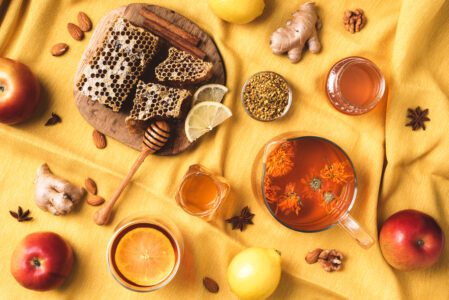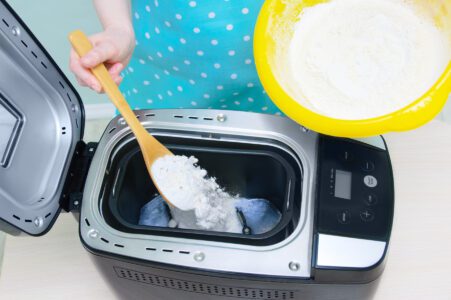Learn more about the history of honey as medicine and you can use it in your everyday life.
I’m still inspired when someone comes up to our farmers market booth and asks if there is any truth in the idea that honey is a health food. For me, a beekeeper and honey enthusiast for 10 years, it’s difficult to imagine that people in the U.S. still think of honey as just a sweetener. Honey’s many medicinal benefits have been employed throughout recorded history, and today we know more than ever about its scientifically backed healing properties.
History of Honey
In North America, the honeybee we know today was an import, brought with European settlers in the 17th century. Before that, this continent had native bees that did not collect as much honey. American Indians probably collected honey from wild hives, though we don’t have much in the way of historical evidence.
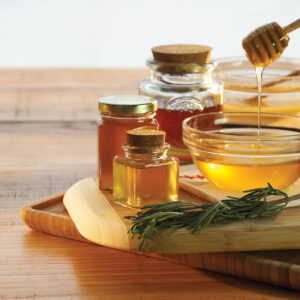
The settlers who brought the bee here clearly understood her value. Yet at some point American culture came to doubt the medicinal quality of honey. Most likely this occurred when Western medicine came to the forefront and cast aspersions on folk healing. We are only now beginning to accept the value of honey as a medicine again with the help of modern medical studies that are returning honey to the hospital for the treatment of diabetic sores and burns, and into medicated bandages for everyday cuts.
Despite our forgetfulness here in the West, the worldwide use of honey as medicine has continued uninterrupted since ancient times. In Egypt, honey figured prominently in the maintenance of life and preparations for death. In ancient Greece, Hippocrates used it as a base for most of his formulations, a practice continued in the works of the medical greats such as Galen and Dioscorides. We have more than 4,000 years of recorded use of honey as medicine from the ancient world to the present. It has even been successfully used as battlefield medicine from the time of The Iliad to as recently as World War I.
Types of Honey
Perhaps some of the reason people doubt the truth of honey’s healing powers lies in its variability. We still believe honey is honey. We know that it is antibacterial, but when someone in one part of the world touts honey as a cure-all for chest congestion, we doubt this lofty assertion rather than observing that their honey is collected in a grove of eucalyptus trees.
Lab tests show that various types of honey differ in their amounts of vitamins and minerals because every honey sample is made up of a different compilation of nectars. Depending which plants bees are visiting, honey can take on “supercharged” levels of certain nutrients and beneficial phytochemicals.
In the past several years, manuka honey has become popular. While this honey is every bit as fabulous as the marketing would have us believe, it’s not unique in its medicinal fortitude. We demonstrate our lack of understanding of the honeybee when we fail to see the complexity of the honeys she creates. To the bee, nectar isn’t mere sugar. Each flower has a varied vitamin and mineral content, so she is really filling her larder with a balanced diet just as we do with our grains, beans, vegetables and dairy. Our shopping lists may also include items to soothe a headache, protect against infection or relieve a cold. Each plant a bee visits has a different phytochemical profile, which allows her to mix her own medicine as well.
In the case of manuka honey, scientists have analyzed the honey that is collected from a specific tree (the manuka tree or Leptospermum scoparium) and found that it has an especially high mineral content and antibacterial activity. Interestingly, the manuka is in the same family as the Melaleuca group, which gives us the well-known antibacterial, tea tree oil.
While manuka is indisputably medicinal, it is important to understand that every culture around the world has had its highly medicinal honeys. In Greece, there is an abundance of thyme honey, while sage, rosemary or lavender honey may be found in other regions of the world. They all contain the benefits of the original plant from which the nectar was collected and can contain phytochemicals that are nourishing and relaxing to the nervous system, protect against fungal overgrowth and much more.
Here in the U.S., one of our most medicinal honeys, buckwheat honey, is very dark and contains high levels of minerals and antibacterial activity, just like manuka honey. It has a rich, molasseslike taste that can be difficult for some people to get used to. Knowing that all well-raised, chemical-free, raw honey has medicinal benefits can free you up to be choosy and splurge on an imported honey, or simply convince you to buy from your local beekeeper instead.
Bees’ Needs
Understanding the complex nature of honey helps us better understand the bee and her needs. Scientists are studying the current disappearance of our bees, yet they often fail to consider bees’ basic needs before entering the lab.
Bees that are trucked from one major monocrop field to another–the common practice in commercial farming–are weakened. Almonds are quite healthy, but if you ate only almonds day in and day out, you would be very sick. Only recently are we seeing growers in these large monoculture systems begin to allow native weeds and medicinal plants to grow in windrows to provide alternative forage for pollinators. As an interesting note, in an article recently published in The New York Times, biologist Mark Winston says, thanks to increases in crop yields, farmers who plant their entire field would earn $27,000 in profit from the farm; those who left a third unplanted for bees to nest and forage would earn $65,000 on a farm of similar size.
We know bodies not fed a balanced diet need more medical care. When the bee is denied the means to remain healthy, she is prey to disease, pests and fungus and is too tired and sick to avoid crops that are sprayed or unacceptably modified. Taking care of the health of the bee is job one–and a vital one for all of us, considering bees pollinate at least 30 percent of the world’s crops and 90 percent of our wild plants. We can’t possibly obtain optimal health benefits from products made by unhealthy bees. Indeed, we may find it much more difficult to survive without healthy bees in our world.
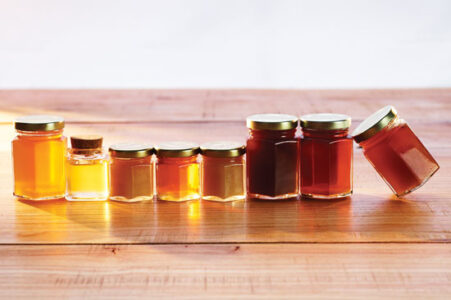
Want more bee products? Learn about the other items available and how they’re harvested in The Sustainability of Bee Products.
Honey in the Medicine Cabinet
Try these effective ways to use honey to heal everyday ailments.
Allergies: Just a teaspoon a day of raw, local honey can decrease symptoms or prevent them altogether. For best results, start this regimen a month before your symptoms typically start to appear.
Arthritis: It may be the alkalinizing effect of a mixture of honey and vinegar that seems to relieve the pain and inflammation of arthritis when used over a period of time. This mix is
anti-inflammatory, used internally or externally.
Conjunctivitis (pink eye): Combine equal parts warm water and honey; stir to mix well. Allow the mix to cool, then apply as an eye wash. Be aware that honey can sting a bit.
Cough: Mix equal parts vinegar and honey, and add a twist of lemon. Drink a bit of this mixture every two to three hours.
Cuts: A dab of honey underneath a bandage may serve you better than any antibiotic cream on the market.
Diabetic sores: Honey is one of the only treatments that can help an unresponsive diabetic wound. Apply directly to the sore and cover with light gauze.
Diaper rash: No matter how bad the rash, honey was always the best remedy for my kids. Just a thin coating and a bit of naked time and it healed up like magic.
Diarrhea: Because it has a balancing effect on digestion, honey is useful for relieving both diarrhea and constipation.
Immune support: Routine eating of raw honey increases B-lymphocytes and T-lymphocytes, two types of white blood cells that improve immunity.
Insomnia: A spoonful of honey before bed can help support a peaceful night’s rest.
Leg cramps: A mix of honey and vinegar rubbed onto the legs before bed increases circulation and can help prevent leg cramps.
Minor burns: Spread honey liberally over the damaged skin of a burn and leave it open to the air. It’s best not to apply anything more than a very light gauze.
Nasal congestion: Add honey to a steam or simply spread it over the sinus areas on the face. Sinus congestion will drain quickly–be ready!
Sinusitis: Add a teaspoon to a cup of saline water and use it in a neti pot. Never use a neti pot while you are congested.
Sore throat: Let a spoonful of honey melt in your mouth or drink it in a cup of hot tea for fast relief from an itching and scratching throat.
Stomach ulcer: Honey inhibits H. pylori, the culprit behind most ulcers; eat 2 to 3 ounces a day for three months.
How to Buy Quality Honey
There is a myth that raw honey is solid. In truth, honey comes out of the comb as a liquid. Depending on the types of nectar and pollen, raw honey crystallizes at different speeds. There’s no good way to know if honey is raw except to check the labels and ask your beekeeper. Here are some questions to guide your next healthful honey hunt.
- Do you use chemicals in your hives? Make sure herbal or nonchemical methods are used.
- Do you harvest with an electric knife? Heated knives can superheat honey, decreasing healthy enzymes.
- Has the honey been filtered? Make sure only the largest particles are strained prior to bottling instead of applying pressure and heat.
- Is the honey pasteurized? While pasteurizing makes honey clear for the store shelf, health and taste are lost.
- When was your honey harvested? For those allergic to spring pollens, spring varietals can provide better allergy protection. Or grab one harvested at the end of the previous season for a full array of pollen protection.
- How do you re-liquify your honey? Bucket heaters can overheat, so consider the speed at which honey is warmed for bottling.
- How do you feed your bees? Many beekeepers feed bees high-fructose corn syrup or boiled sugar water. Find sustainable beekeepers who feed bees their own honey.
- Where are you? Raw, local honey is best for allergies, but all raw honey is beneficial. There’s no mileage limit for sellers to claim a “local” product, so make sure bees are collecting from the same plants as where you live.
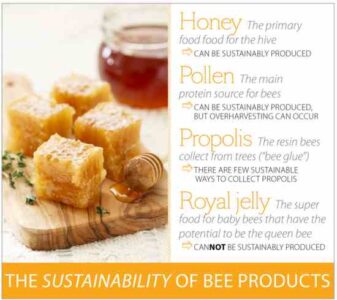
Buy Raw Honey
We encourage you to find local honey sources, but these national suppliers offer sustainably produced honey and honey products.
Dawn Combs is the owner of Mockingbird Meadows Herbal Health Farm in central Ohio and the director of its Eclectic Herbal Institute. Mockingbird Meadows is nationally known for its line of herbal honey spreads. Dawn is the author of Conceiving Healthy Babies: An Herbal Guide to Support Preconception, Pregnancy and Lactation.

